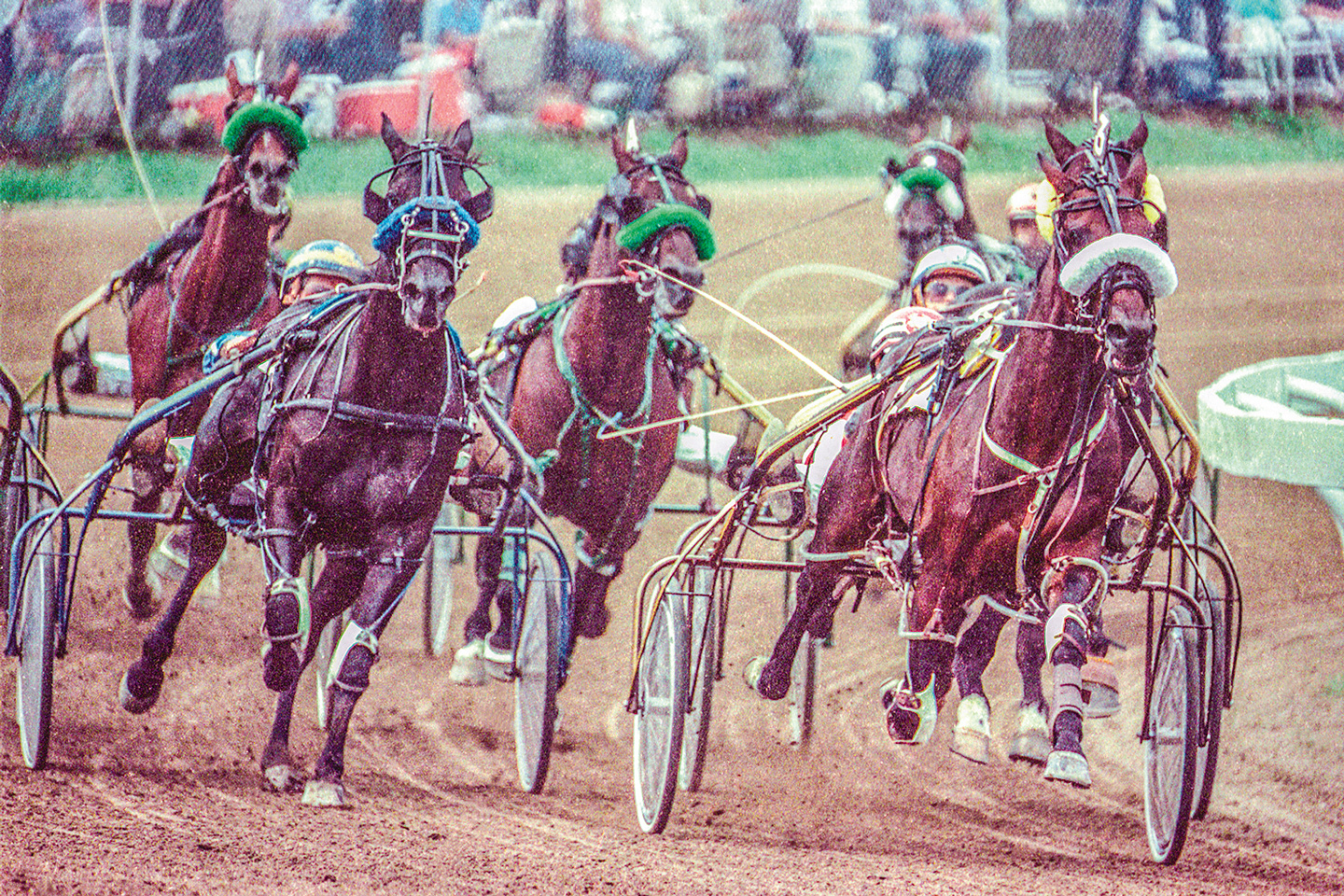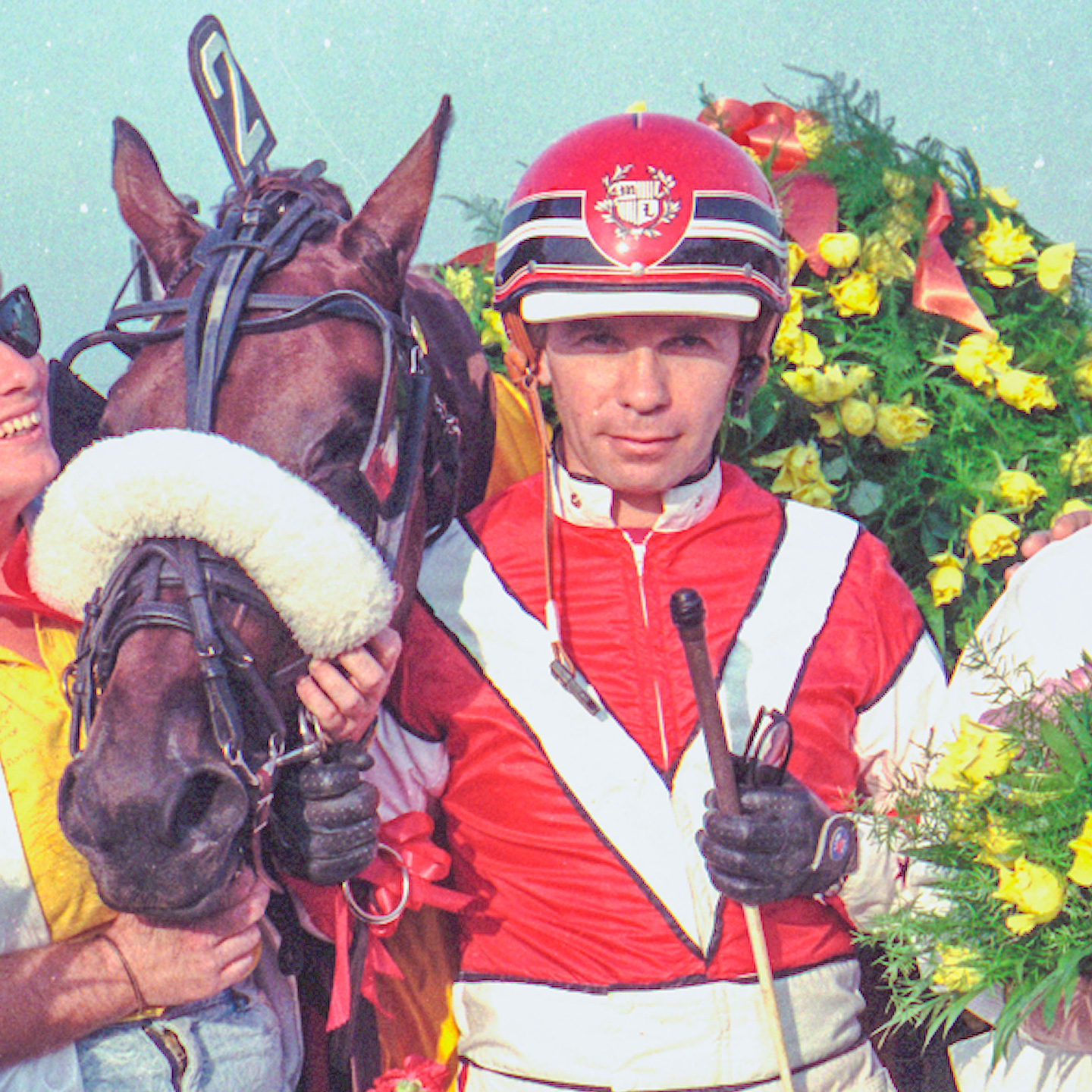Revisiting Lachance and B J Scoot’s 1988 Jug triumph
When he captured the 1988 edition of the Little Brown Jug, B J Scoot became the first Ohio-bred horse to win the second jewel of pacing’s Triple Crown. It was also the first Jug victory for Hall of Fame driver Mike Lachance.
Owned by Sybarite Stable, of Islington, Ont., the bay son of the then Hilliard, Ohio-based Falcon Almahurst notched the eighth victory of his 3-year-old season by capturing the 43rd edition of the storied pacing classic. A record 26 entries passed the box for the Jug that year, with 25 lining up behind the starting gate.

Foaled on May 10, 1985, at Hanover, Pa., B J Scoot was bred and initially owned by Jack Howell, of Bremen, Ohio, and trained during his freshman campaign by William Hartman. The bay colt won 10 of 13 starts during his 2-year-old season, including the $120,000 Curly Smart Pace on Sept. 7, 1987, pacing to a freshman best time of 1:55.1 with William Fahy at the lines at Scioto Downs, and earning $135,611 that season. The colt had begun the season with an easy victory at the Pickaway County Fair, in Circleville, Ohio.
“This colt here, this is the best colt I’ve ever sat behind,” Hartman said in a Sept. 14, 1987, Lancaster (Ohio) Eagle-Gazette feature. “I’d say he’s one of the top five in the country, and each week he gets a little better.”
However, before B J Scoot began his 3-year-old season, he was sold to Sybarite Stable for $240,000 and entered the barn of Hungarian-born trainer Tom Artandi and caretaker Karen Singer. He raced 22 times during his sophomore campaign, but his most impressive effort was at the Delaware County Fairgrounds on Sept. 22 of that year before 47,218 fans, a record crowd at the time.
Lachance had originally been scheduled to drive Keystone Raider, but when that spot was given to John Campbell, Lachance was quick to jump aboard B J Scoot.
“I had raced against him a lot and Thomas (trainer Artandi) told me a lot about him,” Lachance said. “I felt I knew the horse.”
In the first Jug elimination, B J Scoot captured the heat in a national season’s record time of 1:54 in a cakewalk, holding off numerous challengers. Leaving from post four, he led wire-to-wire to win handily for Lachance, while a pair of stablemates — Guida and Cameleon— were second and third. Those two, along with Camtastic and barnmate Threefold, who finished first and third in the third elimination heat, marked the first time a Little Brown Jug had included four horses as one entry.
“He raced a very good mile in the first elimination, and I expect him to do well in the race off,” Lachance quipped after the win. “We are facing the very best colts of the year, but I am very optimistic.”
In the second heat, Lachance steered Dare You To, finishing second to the winning Albert Albert (Chris Boring) in 1:53.4 in the fastest of the three divisions. Just Bold snapped up the last qualifying spot for the final heat.
“We went very fast (:26.2) in the first quarter because I wanted to get on top and didn’t want to get locked in,” Boring said after Albert Albert’s triumph. “Had that been the case, we may not have made it into the final. Albert Albert is a game colt, and you can see the way he fought off the challenges — what a trip!”
In the third heat, Bill O’Donnell was behind the winning Camtastic, as he steered the son of Cam Fella to a 1:54.1 clocking, scoring a two-length victory over Money Lender (Mark Jordan), while Threefold was third for John Campbell.
“My colt responded well, and we went out of there quick,” O’Donnell stressed. “We were not concerned and just waiting for racing room, and we got it. He took the call and went to the front and cruised home without a lot of effort.
“Those are tough colts,” O’Donnell added prophetically when asked about the upcoming final heat. “I know it will be a tough mile.”
O’Donnell was right. B J Scoot drew the rail for the final heat, and Lachance sent the colt away like a bullet, fending off challenges: first from Albert Albert, who battled gamely to the :53.4 half-mile marker — then the fastest ever at Delaware — before tiring and fading to sixth, followed by Camtastic and O’Donnell, who took aim at the three-quarters before also tiring and finishing fifth. Lastly, B J Scoot outpaced the hard-trying duo of Threefold (Bill Fahy) and Dare You To (John Campbell) in the stretch to prevail in 1:52.3.

“The Little Brown Jug is a dream race to win,” Lachance told reporters after the victory. “My horse responded to the challenge. B J Scoot was just a super horse today. If we didn’t get ahead of Albert Albert out of the gate, we were dead. We had to hang on and stay on top; we had no choice. Not too many horses could keep going after a half in :53.4.”
That 1:52.3 clocking was one of the fastest in Jug history at the time, and it was just two-fifths of a second off Nihilator’s Jug record of 1:52.1.
“I was a little concerned at the quarter (:26.4) and half (:27) and then at the 1:23 three-quarters (:29.1), but at the top of the stretch, I felt confident of my horse’s ability to come home strong, and he went to the wire on class. A lot of the race developed out of the draw. Post position is everything in a race like this, and my horse likes to race on top, and so do I,” Lachance offered. “My father took me to see the Jug when I was a little boy, and ever since, I’ve dreamed of winning it someday.”
B J Scoot finished 1-1/4 lengths in front of Threefold (Bill Fahy) with Dare You To (John Campbell) another two lengths back. The colt collected $147,030 for his effort that day at Delaware and wrapped up his 3-year-old season with $671,398 in earnings from eight wins, seven second-place finishes and two third-place finishes. And Artandi came back to win the Jug again the following year with Goalie Jeff.
“B J had a reasonably easy race the first time around,” Artandi said of the colt’s first heat performance. “I always knew he was a contender for the Jug, and I knew he was at his peak.”
B J Scoot started only three times at age 4, earning $21,577 in a lone 1:57 win at Lebanon Raceway on April 29, 1989. He returned as a 5-year-old, going postward 34 times with three wins, seven second-place finishes and six third-place finishes, and earning $62,424, with a 1:54.4h clocking that came at Freehold Raceway on Aug.18, 1990.
By the time of his retirement at age 6, B J Scoot had amassed $891,010 from 22 wins in 72 starts. He stood stud in Ohio from 1991 through 1996 when he was leased to Pickwick Farms of Gates Mills, Ohio, and then was sold to Canadians Nigel Holmes and Gerry Hudon, who stood him at stud in British Columbia from 1997 through 2000 and then in Alberta through 2002.
While not able to replicate himself in the breeding shed, B J Scoot had the pedigree to become a decent sire, as he was the fourth of 10 foals out of the prolific Melvin’s Woe p,3,1:57 ($157,902) mare Terry’s Woe p,4,1:55 ($326,162). He was a full brother to BJ’s Boardwalk p,4,1:54 ($113,602) and a half-brother to BJ’s Fifth Avenue (by Niatross) p,4,Q1:56 ($105,985). As a sire, B J Scoot produced 117 starters who earned $1,994,533, with 41 timed in 2:00 and four clocked in 1:55 or faster. Some of his better progeny include Peach Pie (out of Radiate) p,4,1:54f ($201,845); OK BJ (out of Whose To Care) p,5,1:54f ($193,584); Ace Freely (out of Dibby Dibby Girl) p,4,1:55.3f ($107,143); and Hescootshescores (out of That Will Be Me) p,4,1:54.4f ($88,554).
This story appears in the September 2025 issue of Hoof Beats, the official magazine of the USTA. To learn more, or to become a subscriber to harness racing’s premier monthly publication, click here.
